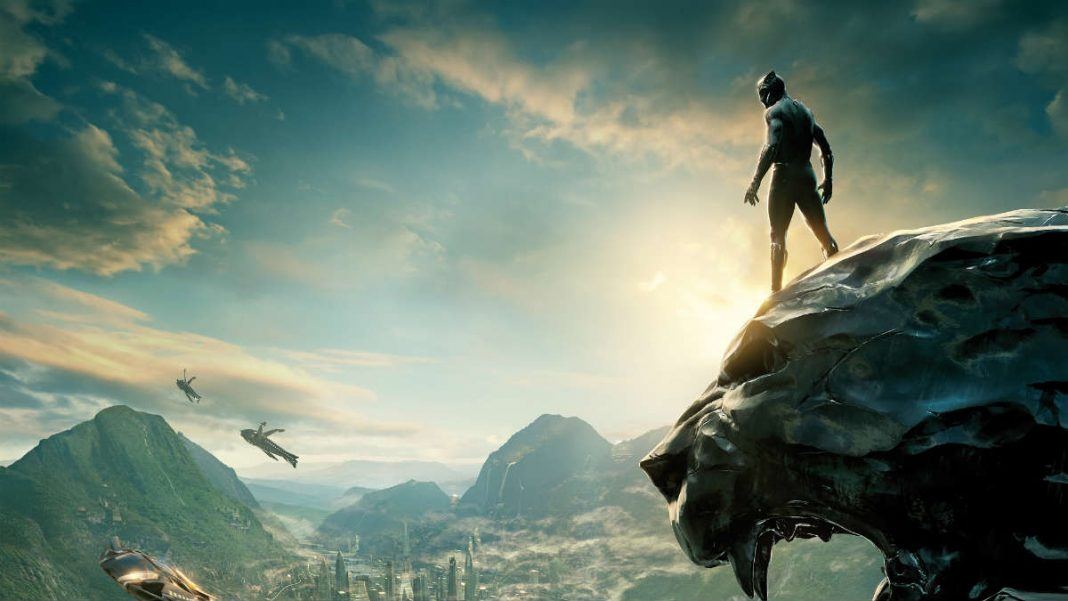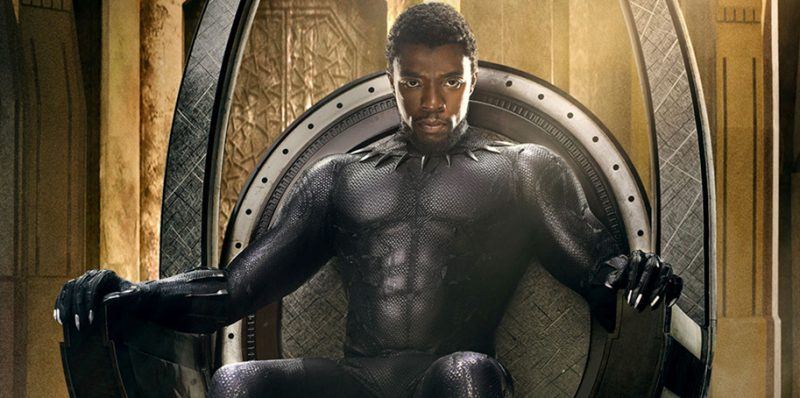
Marvel‘s King T’Challa of “The Black Panther” shattered black culture movie box office myths with global ticket sales an estimated $387 million for the President’s Day weekend.
A wave of feverish anticipation, fawning critical acclaim and groundbreaking cultural meaning pushed “Black Panther” to a record-setting $192 million debut in U.S. and Canada theaters, firmly establishing the superhero sensation as a box-office landmark.
The Marvel film from the Walt Disney Co. blew past expectations to become the fifth-highest-grossing debut ever, not adjusting for inflation, following only “Star Wars: The Force Awakens,” ″Star Wars: The Last Jedi,” ″Jurassic World” and “The Avengers.”
In estimates Sunday, Disney predicted a four-day holiday weekend of $218 million domestically and a global debut of $361 million.
Though the film’s international footprint doesn’t include several of the largest markets — China, Russia and Japan — it still ranks among the top 15 global debuts ever. It’s also the highest-grossing February opening weekend.
“All hail the King of Wakanda!” Disney declared, referring to the movie’s mythical and highly advanced African nation.
Ryan Coogler’s film, which cost about $200 million to make, is the most expensive movie with a largely black ensemble and among the few to be centered on a black superhero. The strong opening suggests “Black Panther” will easily set a box-office record for films directed by a black filmmaker.
The previous best is Sidney Poitier’s 1980 comedy “Stir Crazy,” which took in $322 million domestically when inflation is calculated.
“Black Panther” instantly became the top-grossing film in history by a black director (Ryan Coogler) and featuring a largely black cast. The previous record-holder was “Straight Outta Compton,” which collected $214 million worldwide in 2015 — over its entire run — after adjusting for inflation.
“Black Panther” set pre-sale records and saw lines around theaters over the weekend, including some who came costumed for the event.
“This is the very definition of a blockbuster: People lining up around the block to see a great movie,” said Paul Dergarabedian, senior media analyst for comScore. “A movie like ‘Black Panther’ is a cultural event that nothing on the small screen can really match in that way.”
Chadwick Boseman stars as T’Challa/Black Panther in the first stand-alone film for the superhero created by Stan Lee and Jack Kirby in 1966. The cast also features Michael B. Jordan, Lupita Nyong’o, Daniel Kaluuya and Letitia Wright.
The movie has been hugely acclaimed, with a 97 percent fresh rating from Rotten Tomatoes. Audiences agreed, giving it an A-plus CinemaScore. The film especially resonated among African-Americans, who made up 37 percent of moviegoers, according to comScore.
Dave Hollis, distribution chief for Disney, called the film’s success “a real source of pride” for Disney.
“Inclusion and representation matters,” Hollis said. “We know that great stories can come from anywhere, and our goal is to make films that reflect the wonderful diversity of our world and resonate with audiences everywhere — no matter who they are, no matter where they come from.”
Coming at one of the slower periods of the year, “Black Panther” benefited from little competition, and it can be expected to dominate the marketplace for weeks.
Disney, which supported “Black Panther” with a lavish nine-month marketing campaign, said on Sunday that ticket sales for the film in North America will total roughly $218 million between Friday and Monday. Theaters scrambled to add show times to accommodate crowds; AMC Southlake 24 in suburban Atlanta squeezed in 84 show times on Friday alone. In many cities, moviegoers arrived in outfits inspired by the film.
Analysts had expected “Black Panther” to arrive to about $165 million in North American ticket sales, which would itself have been an astounding result for a release outside the holiday and summer corridors. The previous domestic record-holder for a February release was “Deadpool,” which collected an adjusted $159 million over Presidents’ Day weekend in 2016.
North American audiences appeared to love “Black Panther” as much as critics, signaling a strong run ahead. The euphorically reviewed film received a rare A-plus grade from ticket buyers in CinemaScore exit polls. Black viewers made up about 37 percent of the domestic turnout, according to PostTrak, fueled by large numbers of church and school groups, not to mention the pent-up demand for a superhero film led by black actors.
Last week’s top film, the erotic romance sequel “Fifty Shades Freed,” slid to third place, with $16.9 million in its second week for Universal. Sony’s children’s book adaptation “Peter Rabbit” held much stronger, taking the No. 2 spot with $17.3 million in its second week.
But moviegoers — and Hollywood — were focused on “Black Panther,” including how it would fare overseas. Though considered by most to be an outdated myth, some have claimed that foreign audiences have less appetite for films with largely black casts.
“Black Panther” vanquished those notions with $169 million in ticket sales. It was No. 1 in most international markets, though “Fifty Shades Freed” bested it in Germany.
There was never any doubt that “Black Panther” would rock the North American box office. Kevin Feige, the prodigy who runs Marvel, and Alan F. Horn, Disney’s movie chairman, have delivered one juggernaut after another. Robert A. Iger, Disney’s chief executive, took a personal interest in “Black Panther,” approving its $200 million production budget (at least 30 percent more than budgets for other Marvel nonsequels like “Doctor Strange” and “Ant-Man”) despite concern by some at Disney about sales of “Black Panther” toys.
The concept of an African story, with actors of African descent at the forefront, combined with the scale of modern franchise filmmaking, is something that hasn’t really been seen before,” Mr. Coogler, the director, told The Hollywood Reporter. “You feel like you’re getting the opportunity of seeing something fresh, being a part of something new, which I think all audiences want to experience regardless of whether they are of African descent or not.”
But no one quite knew how “Black Panther” would perform overseas.
Big-budget films that focus on black characters have long been held back by the Hollywood argument — a ridiculous one, in the eyes of many critics — that foreign audiences have little interest in films with largely black casts. It has been a self-fulfilling attitude; studios, ever fixated on what kinds of movies have succeeded in the past, never challenged the assumption with a big-budget fantasy because they were always too afraid to take the risk.
“Black Panther” arrived to very strong results in the United Kingdom, Belgium, Ukraine, South Korea, Mexico, and Brazil, in many cases beating initial ticket sales for Marvel nonsequels based on lesser-known characters, including “Guardians of the Galaxy” in 2014.
“Black Panther” was softer in Germany, an important market, where the sadomasochistic “Fifty Shades Freed” outsold it.
“We’re extremely pleased with the reaction around the world, even more so because we face nothing competitively for a month,” said Dave Hollis, Disney’s president of distribution.
Disney will release “Black Panther” in Russia, China, and Japan in the weeks ahead. Success in China, the world’s fastest-growing movie market, would be particularly sweet. If audiences there do not respond, however, it could have little to do with race. Hollywood imports are losing their luster in China as local studios become more skilled at making blockbuster-style movies. (Over the weekend in China, the locally produced “Monster Hunt 2” arrived to more than $130 million in ticket sales. Lionsgate gave it a 69-screen release in the United States, collecting $390,000.)
The frenzy surrounding “Black Panther” has been puzzling to some.
“It’s an important chipping away at this Hollywood notion that somehow studios are taking a bigger risk if they cast nonwhite actors, but I don’t see it as a profound change,” said Todd Boyd, a cinema and media studies professor at the University of Southern California who focuses on popular culture and race. “I ultimately see it as exploiting a profitable niche.”
“To me, there is real change afoot when diverse actors are cast in roles that are not inherently diverse,” Mr. Boyd added.
But many people stood in line to praise Disney for pushing toward more diverse filmmaking. Richard Gelfond, chief executive of Imax, the large-format movie exhibitor, which played “Black Panther” in more than 60 countries, championed Disney for delivering “content that is compelling on its face but also bridges the gap between different cultures, and ultimately is a reflection of the shared values of moviegoers all over the world.”
Phil Contrino, director of media and research for the National Association of Theater Owners, noted the power of seeing “Black Panther” in a communal setting on a big screen. “Hopefully someday we’ll look back at the release of ‘Black Panther’ as the turning point when diversity and positive representation in blockbusters switched from being an anomaly to being normal,” Mr. Contrino said.
And Stacy L. Smith, an author of blistering studies about Hollywood’s lack of diversity, wrote on Twitter in a message to Mr. Iger, who has made inclusion a priority across Disney: “We have been watching; lead & supporting roles have been changing as well as behind the camera. There is more to be done but this weekend is a giant leap forward.”
This weekend, the Chinese New Year holiday, local productions led by “Monster Hunt 2” and “Detective Chinatown 2″ dominated Chinese theaters with more than $150 million in ticket sales each.
“Black Panther” also performed especially well on large-format screens. Imax reported $30 million in ticket sales for the three-day weekend.
“There was a groundswell of wanting this movie to work, and then when it actually did as a film, itself, it just kicked it up a notch to a level no one could have ever predicted,” said Greg Foster, Imax Entertainment’s chief executive. “That makes me feel really good about the movie business.”
Estimated ticket sales for Friday through Sunday at U.S. and Canadian theaters, according to comScore. Where available, the latest international numbers for Friday through Sunday also are included. Final four-day domestic figures will be released Tuesday.
- “Black Panther,” $192 million ($169 million international).
- “Peter Rabbit,” $17.3 million.
- “Fifty Shades Freed,” $16.9 million.
- “Jumanji Welcome to the Jungle,” $7.9 million.
- “The 15:17 to Paris,” $7.7 million.
- “The Greatest Showman,” $5.1 million.
- “Early Man,” $3.2 million.
- “Maze Runner: The Death Cure,” $2.5 million.
- “Winchester,” $2.2 million.
- “Samson,” $2 million.
Estimated ticket sales for Friday through Sunday at international theaters (excluding the U.S. and Canada), according to comScore:
- “Black Panther,” $169 million.
- “Detective Chinatown 2,” $155 million.
- “Monster Hunt 2,” $141 million.
- “Operation Red Sea,” $70.3 million.
- “The Monkey King 3: Kingdom of Women,” $52.3 million.
- “Fifty Shades Freed,” $47.7 million.
- “Boonie Bears: The Big Shrink,” $32.6 million.
- “The Shape of Water,” $12.3 million.
- “Maze Runner: The Death Cure,” $11 million.
- “The Greatest Showman,” $9.6 million.


